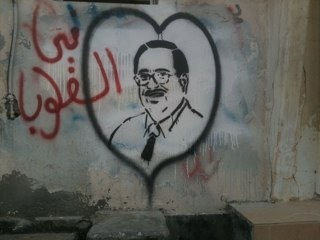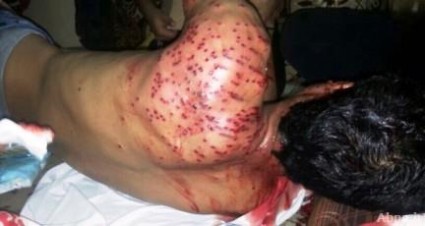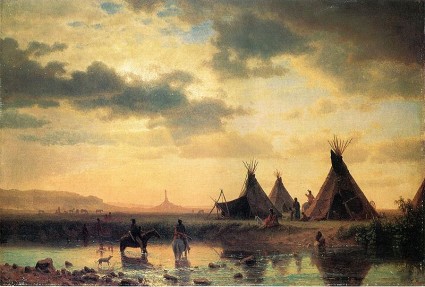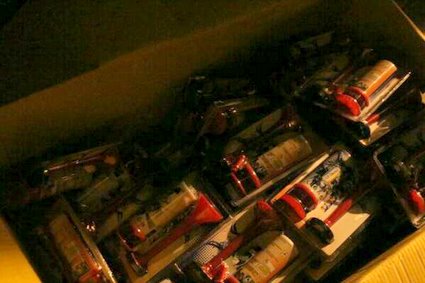Maiming by Birdshot – The Timoney and Yates Doctrine
The extensive, heavy handed, use of Bird-shot against Protesters did not appear until the Bahrain Regime hired John Timoney and John Yates as Security Consultants at the behest of the US Secretary of State Clinton. It emerged as a means to maim protesters so they could be captured when the sought medical attention. The practice conspicuously evolved immediately following the BICI Report that the regime has largely failed to implement. Has anyone ever noticed how much Iraq’s Saddam and King Hamad look alike – creepy. Phlipn out.
Bahrain’s doctors – Harsh treatment
28 January, 2014 – by Economist
IN THE three years since Bahrain’s iteration of the Arab spring sputtered out in the grip of a government crackdown, Rula al-Saffar, 51, has gone from nurse to detainee to activist. At her home a stone’s throw from the hospital where she is effectively barred from working, Ms Saffar is busy with a campaign she began in December to track and tally Bahrain’s prisoners of conscience.
“Our mission is to get them released and for the government of Bahrain to respect all the international covenants regarding prisoners of conscience,” she said, wearing a t-shirt bearing the image of Martin Luther King Jr. So far, families have registered 161 detainees on the campaign’s website, 56 of whom are students.
This activism is probably not what the ruling Khalifa monarchy hoped for when it brought criminal charges against Ms Saffar and 20 other medics for their alleged support for anti-government protests that took place in February and March of 2011. Rather than give up, Ms Saffar is now turning other Bahrainis into amateur medics.
After being released from her five months in detention in 2011, during which Ms Saffar said she was electrocuted, slapped around and sexually harassed, she was told she could only return to her job as head of a nursing program at Bahrain’s College of Health Sciences if she swore an oath of loyalty to the regime. She refused.
Now she delivers instructions for basic medical treatments over Skype, fearing that treating protesters in person could land her back in jail. Nearly every week, she says, she gets phone calls from those at protests in Manama’s Shia-majority suburbs such as Karrana and Sanabis, hotspots for dissent against the ruling Sunni Khalifa family, asking how to dress wounds.
The difficulty of Ms Saffar and many of her fellow medics is linked to the decision of both protesters and security forces to make Salmaniya, the country’s only full-service public hospital, a flashpoint of the 2011 unrest. Bahraini security forces in March 2011 took control of Salmaniya and cordoned off part of the sixth floor to interrogate patients, an independent commission found. The commission also concluded that some doctors in Salmaniya strayed from medical neutrality by participating in anti-government demonstrations.
Bahrain’s medical system has yet to recover from this politicisation. Doctors detained in 2011 who have returned to work say that it is still not safe for those wounded in clashes with police in ongoing unrest to seek treatment at a public hospital, or even at some private clinics.
According to a doctor working in Salmaniya, a patient who shows signs of protest-related wounds—burns to the hands or birdshot to the body—will be interrogated by a hospital security guard, often before a nurse or doctor has seen him. The guard then monitors the patient throughout his stay in Salmaniya and often arrests him after he is discharged, the doctor said. This exact scenario is difficult to verify (the Ministry of Health declined to comment by phone), but several doctors interviewed agreed that the threat of arrest hangs over protesters who check into a hospital. Protesters now tend to avoid hospitals unless gravely wounded.
Some doctors try to help by quietly treating people. “It’s my medical obligation to treat those regardless of the type of injury or the trauma inflicted on them,” said a surgeon who runs a private clinic in Manama. In recent weeks, he treated a teenager whose orbital socket had been broken, allegedly by a combination of a stun grenade and a policeman hitting him in the face.
The doctor asks protesters to lie low until bodily signs of clashes with the police have subsided. He then registers the patient as suffering from a cold or simple ailment that won’t draw the attention of security forces. He stitches the protester up, prescribes medication and sends him on his way. …more
February 2, 2014 No Comments
Bahrain’s Fate and Visioning it’s Future
I remember meeting Sharif a few days before the crackdown. We sat at a burger restaurant, and I asked him about their main demand. He said, “The most important is to elect a constitutive committee representative of the people to write a new constitution for the country to replace the current one. Everything else is secondary.” I said, “You realize they will not accept that, and that this basically means there will be a showdown.” He looked up from his hot dog, paused, and then nodded.
“Yes, it probably does.”

Bahrain’s Fate
by Omar AlShehabi – JACOBIN – January, 2014
On Ibrahim Sharif and the misleadingly-dubbed “Arab Spring.”
The Arab uprisings have unleashed fraught issues around identity and national sovereignty. Within the struggles for a better future, opportunism and sectarian politics run rife. Amid suffusing uncertainty, some yearn for despotism or the old stability of Western colonialism.
Although the events have given way to many movements, activists that oppose the hydra of Western intervention, despotism, and sectarianism that confronts the Arab world are rare. Ibrahim Sharif, a Bahraini opposition figure, is a prominent exception. And, manifestly, a dangerous one: he is currently in prison, having been tortured, and facing the remainder of a five-year sentence. His plight has barely registered beyond Bahrain’s shores, but there is no better story than his to illustrate the complexity of this necessary fight.
Sharif was born on 15 May 1957, the ninth anniversary of the Nakba — which saw the expulsion of hundreds of thousands of Arabs from historic Palestine — and the establishment of the state of Israel. His birthplace was Muharraq, the second-largest island in the Bahraini archipelago, and at that time the hub of political opposition to British colonialism. Sharif’s home was in Steeshan, a lower-middle-class neighborhood deriving its name from the English word “Station,” after the old central bus station that used to be located at the top of the neighborhood.
As with most people in Steeshan, Sharif’s family came from a Huwala background — a Sunni ethnicity that populates the two coasts of the Gulf, between the colliding Arab and Persian cultures. Such movement between the Gulf’s two worlds used to be commonplace, especially in a maritime economy built on mercantilist trade, well before the drawing of borders and the advent of modern nationalities in the region.
Sharif’s family came to Bahrain in the early twentieth century from Behdeh, a small village on the eastern coast. He came from a Sayyed lineage, his family claiming descent from the Prophet Mohammed’s daughter. Sayyed families have much less resonance among Sunni discourse than Shi’a, as the concept confers much more social, economic, and religious prestige and benefits to the latter.
The Huwala are a minority in Bahrain. Some members within the other ethnic groups look on their claims of Arabness with suspicion, due to their roots on the eastern coast of the Gulf. This perspective suggests a racial view of Arabness, imagining it can only be determined by clear and unbroken lineage to a tribe from the Arabian Peninsula. This blood-based identity discourse contrasts sharply with the modern notion of Arabness accompanying Arab nationalism, which takes language to be its primary trait.
This complex historical lineage has led many Huwala in Bahrain to embrace Arab nationalist currents, and the city of Muharraq, where most Huwala are concentrated, has become that movement’s main urban center. This is common among many minorities in the Arab world. For example, Christians and Alawites also disproportionately fill Arab nationalism’s ranks. The ideology has been presented as a unifying, non-sectarian, non-racial force that could guard against the tyranny of the majority and facilitate development in societies prone to sectarianism and ethnic divisions. …more
February 2, 2014 No Comments
20 Years of Walking Slowly – the struggle we share on every corner and village in the world
From Fire to Autonomy: Zapatistas, 20 Years of Walking Slowly
25 January, 2014 – By Andalusia Knoll and Itandehui Reyes -Truthout
Journalism with real independence and integrity is a rare thing. Truthout relies on reader donations – click here to make a tax-deductible contribution and support our work.
Speaking in the mountains of Chiapas, Mexico, on a cold drizzly New Year’s Eve, the Zapatista Comandante Hortensia addressed the crowd: “Twenty-five or 30 years ago we were completely deceived, manipulated, subjugated, forgotten, drowned in ignorance and misery.” She was communicating the official words of the Zapatista Army of National Liberation (EZLN) on the 20th anniversary of their rebellion, when thousands of indigenous people rose up in arms, took over dozens of major towns and villages in this southern state, and declared “enough is enough, never again will there be a homeland that doesn’t include us.”
Comandante Hortensia went on to explain how over the past two decades, they have constructed their own autonomous government, complete with their own health and education system, based in the indigenous traditions of their ancestors. Despite the continual efforts of the “neoliberal bad government” to displace them from their land, the Zapatistas have successfully recuperated thousands of acres of land on which they have constructed communities that are governed “from the bottom up.” Community members participate in rotating government positions that operate under the democratic principle of “mandar obedeciendo” (commanding by obeying).
The Mexican government has attempted to introduce social programs with the goal of co-opting and dividing the indigenous population in Zapatista areas. However, the indigenous rebels, who reject all forms of government handouts, have successfully resisted co-optation. If you ask a Zapatista how many are in the ranks, they will just respond “somos un chingo,” which loosely translates into “there are a whole lot of us.” Official estimates put their numbers at 250,000 people or roughly 10 percent of the population of the state of Chiapas.
Zapatista communities are spread throughout the large southern Mexican state of Chiapas, which includes coastal, mountainous and jungle regions. They have created five Caracoles, which are the centers of “good government” and points of coordination for the Zapatista health clinics, schools, community banks and independent media projects.
Resistance to NAFTA, the Death of the Mexican Farmer
On January 1, 1994, the NAFTA free trade agreement entered Mexico with vigor, promising foreign investment and economic prosperity at the expense of the plunder of natural resources. NAFTA is largely credited for flooding the Mexican market with subsidized corn from the United States, which decimated farmers’ livelihoods and provoked massive migration to the United States. Two years prior to NAFTA’s implementation, former President Carlos Salinas opened the floodgates to land privatization by reforming Article 27, which had protected communally owned land known as ejidos, created during the Mexican revolution. Thus, the introduction of NAFTA provided the perfect context for the uprising of the indigenous guerillas who formed the EZLN. …more
February 2, 2014 No Comments
Bahrain’s Crown Prince Salman deceives with dialogue, guns young men down in Streets
Time running out as Bahrain tries to revive national dialogue
By Bill Law – BBC News – 29 January, 2014
Bahrain’s Crown Prince Salman bin Hamad bin Isa Al Khalifa shows the UK’s Prince Andrew round the Bahrain International Airshow (16 January 2014) The meeting between Prince Salman (centre) and the opposition came a day before a visit by Prince Andrew
A recent meeting between Bahrain’s crown prince and opposition representatives has raised hopes that the suspended national dialogue process could be revived. The BBC’s Bill Law looks at the prospects for ending the deadlock in the Gulf island kingdom.
Prince Salman bin Hamad bin Isa Al Khalifa’s decision to hold talks on 15 January with leaders of the five main opposition groupings for the first time since pro-democracy protests erupted three years ago surprised many observers.
Afterwards, the main Shia opposition bloc, al-Wefaq, said the meeting had been “especially frank and very transparent” and studied ways to have a “serious dialogue that would result in a new political framework that shapes a comprehensive solution”.
The government meanwhile said the parties had committed to “accelerate dialogue and elevate discussion by including more senior representatives from all parties”.
The meeting was notable for at least two reasons.
The first was the prominent role of the crown prince.
Seen as a moderate in the Sunni ruling family, the Al Khalifa, he has effectively been sidelined since 2011 by hardliners who want few if any concessions to be made to the Shia majority demanding greater rights and an end to discrimination.
The second reason was the presence at Prince Salman’s side of one of those hardliners – the Minister for the Royal Court, Sheikh Khaled bin Ahmed bin Salman Al Khalifa.
The hardliners have been accused of trying to undermine the national dialogue, so it was surprising to see Sheikh Khaled at a meeting to revive the process only days after the government had suspended it, blaming the opposition for the breakdown.
‘Deep-rooted issues’
A source told the BBC that after halting the dialogue, the Khalifas had come under “intense” pressure from Western allies to get it back on track.
“The royal family needed to show the UK and US that it was doing something.”
However, the source said the opposition’s meeting with the crown prince had been merely a “branding exercise”, adding: “The hardliners are simply playing for time.”
Not long after the talks, the UK government published its response to a critical report by the House of Commons Foreign Affairs Committee.
MPs had criticised what they described as the failure of Bahrain to “quickly implement the important and practical recommendations of the Bahrain Independent Commission of Inquiry”, a review commissioned by King Hamad bin Isa Al Khalifa in 2011 that delivered a searing indictment of his government and its handling of the protest movement. …more
February 2, 2014 No Comments
Big Oils last Stand: Gathering Clouds form ‘Epic’ Opposition from Native American Alliance
The Oglala Sioux Tribe passed a resolution Friday banning TransCanada and former AFN national chief Phil Fontaine, who has been hired by the energy firm to deal with First Nations opposition to its Energy East project in Canada, from entering its territory.
Keystone XL ‘Black Snake’ Pipeline to Face ‘Epic’ Opposition from Native American Alliance
by Jorge Barrera – APTN National News – 1 February, 2014
A Native American alliance is forming to block construction of TransCanada’s proposed Keystone XL pipeline which still needs final approval from U.S. President Barack Obama after the State Department released an environmental report indicating the project wouldn’t have a significant impact Alberta tar sands production.
Members from the seven tribes of the Lakota Nation, along with tribal members and tribes in Idaho, Oklahoma, Montana, Nebraska and Oregon, have been preparing to stop construction of the 1,400 kilometre pipeline which is slated to run, on the U.S. side, from Morgan, Mon., to Steel City, Neb., and pump 830,000 barrels per day from Alberta’s tar sands. The pipeline would originate in Hardisty, Alta.
“It poses a threat to our sacred water and the product is coming from the tar sands and our tribes oppose the tar sands mining,” said Deborah White Plume, of the Oglala Sioux Tribe, which is part of the Lakota Nation in South Dakota. “All of our tribes have taken action to oppose the Keystone XL pipeline.”
The U.S. State Department released its long awaited environmental report on TransCanada’s proposed pipeline Friday. The report found that the pipeline’s operation would not have a major impact on Alberta tar sands production which is also at the mercy of market forces.
“Approval or denial of any one crude oil transport project, including the proposed project, is unlikely to significantly impact the rate of extraction in the oil sands or the continued demand for heavy crude oil at refineries in the United States based on expected oil prices, oil sand supply costs, transport costs and supply-demand scenarios,” said the report.
The project will now go into a final phase which focuses on whether Keystone XL “serves the national interest.” Pipeline’s environmental, cultural and economic impacts will be weighed in this phase and at least eight agencies will have input on the outcome, including the Department Defence, Justice, Interior, Commerce, Transportation, Energy, Homeland Security and the Environmental Protection Agency. …more
February 2, 2014 No Comments
Terrorizing Dissent
Terrorizing Dissent: Harper’s approach to defining terrorism is shamelessly bald
By Azeezah Kanji – 31 January, 2014
“When a government starts trying to cancel dissent or avoid dissent is frankly when it’s rapidly losing its moral authority to govern.” — Stephen Harper, 2005 (as Leader of the Opposition)
If dissent is the lifeblood of democracy, then Prime Minister Stephen Harper seems determined to render Canada anaemic.
The backdrop for Harper’s latest assault was his recent visit to the Middle East. The National Council of Canadian Muslims (NCCM) criticized the inclusion of a supporter of anti-Muslim demagogues Pamela Gellar and Robert Spencer in Harper’s Israel-bound entourage.
Instead of addressing NCCM’s concern, the Prime Minister’s Director of Communications Jason MacDonald peremptorily dismissed it with a vicious smear:”We will not take seriously criticism from an organization with documented ties to a terrorist organization such as Hamas,” MacDonald said.
This is a very serious claim, with potential criminal implications: Hamas is officially listed as a terrorist organization in Canada. To level such an accusation without a shred of competent evidence is quite likely libellous. Presumably, if there actually were any documents backing the assertion of “documented ties to a terrorist organization such as Hamas,” the government would have produced them and charged NCCM in a court of law — rather than resorting to indictment in the court of public opinion.
Since the inception of the “war on terror,” insinuations of terroristic connections have been used to vilify Canadian Muslims as “not really Canadian” and disloyal, treasonous, unentitled to the rights and benefits of belonging to Canada. Canadian Muslims erroneously branded as “terrorist threats” have been extraordinarily rendered (Maher Arar), incarcerated in foreign prisons and tortured (Maher Arar, Ahmed El-Maati, Abdullah Almalki and Muayyed Nureddin), stranded abroad and actively prevented from returning home (Abousfian Abdelrazik) and harassed at airports and borders (too many to name).
For Muslims in Canada, being falsely accused of terrorism is quite literally terror-producing. And the damage isn’t cured by formal exoneration: as Justice Dennis O’Connor observed in his report on the Arar case, “Labels, even unfair and inaccurate ones, have a tendency to stick.” …more
February 2, 2014 No Comments
Violence Sounding – Regime Discovers Large Terrorist Weapons Cache in Bahrain
February 2, 2014 No Comments
Rihanna al Mousawi, Tormented for Protest, Imprisoned on Lies
Rihanna al Mousawi, Tormented for Protest, Imprisoned on Lies
02 February, 2014
Rihanna al Mousawi was arrested last April for “planning to bomb” the FI Race. She and Nafeesa were accused by the Public Security Chief General Tariq Hassan of attempting “ a dry run to test the security measures at the F.I.” by carrying a cushion under their dresses.
What happened to her after the FI races ? She was tortured and her 16 year old son Husein was threatened with torture. She was taught a “fabricated tale” several times and beaten on her head if she made a mistake. She was threatened with rape if she changed her story and forced to stand naked in a doorway. She was interrogated for 3 hours by the Attorney Genera Fahed Albuainain and then allowed to phone her family briefly.
She suffered a further interrogation by seven hooded men holding up photos of activists including Naji al Fateel, Hadi Al Moussawi and Hisham al Sabbagh, demanding if she knew them. She was accused of going to the Lebanon to receive training in weapons. Rihanna thought she’d be accused of campaigning for the detainees at the F.I. Race. She now finds herself accused of being a member of the “14th February Coalition” a vague media group that is anti-Government.
At the first court session she bravely spoke about her torture but Judge Ali Al Deraini laughed and wasn’t interested. He allowed the prosecution to make their case, but denied the defendants or defence lawyers to say anything. The defence lawyers petitioned to have the Judge removed for bias, but failed.
The 14th February defendants were sentenced to 5 – 15 years on 25th September 2103 and are appealing. Rihanna and Nafessas have the separate case on the “bombing” charge. The next session for the 14th Feb is 27th February and the bombing charge on16th February.
Rihanna is seriously ill with cancer, has a jaw brace and is confined to a wheel chair. What can you do to help her? Demand her release and say FI Race should NOT take place in Bahrain in April 2015. Otherwise another 60 people will be tortured and jailed for our sporting pleasure.
February 2, 2014 No Comments
America Needs Critical Thinking and Sense of Humanity
America Needs Critical Thinking and Sense of Humanity
27 January, 2014 – Mahboob A. Khawaja, PhD. – Cyrano’s Journal Today
On January 16, 2014, CNN moderator Don Lemon asked Professor William Pollack (Clinical Psychologist, Harvard University), why are we witnessing daily carnage of civilian bloodbaths – shootings in schools, shopping malls, movie theatres and street grocery stores? What has gone wrong with the American Society? The answer Professor Pollack offered tells a lot and perhaps not too many morally conscientious Americans could disagree with. America lives in a “disconnect” world being unaware of the surrounding real world. An imaginary world of self- indulgence in a prevalent culture of cell phones, text messages, footballs match shouting and excluded entirely from the mainstream of human realities. Another female commentator explains: we are waging wars on ourselves by disregarding the world around us. Once the cell phone is turned off, we are not sure, how to cope with the impinging real world except taking out guns, shooting at random and killing the innocent people. One wonders if this is what America has come to absorb – fair as foul and foul is fair – the traditional American moral and intellectual psyche wants practical and remedial answers which nobody seem to articulate. Are the American moral and intellectual values been replaced with self-generated violence, hatred of others and self- survival of the fittest? Questions and answers on the news media come and go but the societal reality remains the same.
A year earlier, Finian Cunningham (“Killing Children Is the All-American Way.” Dissident Voice: 12/22/2012) raised similar concerns on the growing diasporas of the US political culture:
“Americans need to look at how their society has increasingly become a psychopathic culture of death over many decades. Americans need to realize how their hallowed capitalist ideology of the putative American Dream is in practice nothing but the destruction of communities and millions of individuals on the altar of elite profit-making. Think about the glib, common parlance used to describe the process of human destruction. Investors “make a killing”; workforces are “liquidated”; society is facing a “fiscal cliff”.
In reality, the long waited Third World War was launched by George W. Bush in March 2003 against Iraq. After its failure in Afghanistan in 2001 to come to terms with Reason, Washington- based Industrial and Military Complex prepared the US politicians including the Congress for another global savagery without any reason. From George W. Bush to Barrack Obama, the global insanity of wars has not halted in any manner. Both betrayed the trust of the American masses that elected them to foster peace and harmony across the nations of the world. America cannot exclude itself from the consequences of what it does to others. Today is the memorial day of Dr. Martin Luther King, Jr., had he lived longer to see how his dream was sabotaged – The Vision of a New America, his moral and intellectual spirit would have been more tormented: “He said, O Lord, we ought to be, what we are not.” Agreeably, we live in God’s created One World- One Planet. All and every things that happen affect us all. At human conscientious level, words depict a picture of virtual reality, The CNN moderator was worried and horrified as to what is next – the cost of political success of the few warmongers leading America to ruthlessness and bloody degeneration? Are we in a different time span than the political affairs, action-reaction of violence and threats of aggression and what oppressed the mankind prior to the imposed human insanity of the WW2? Both World Wars were fought by man against man. Leaders and nations complacent in making the Two World Wars are again coercing the mankind to animalistic thinking and behavior without realizing the consequences of their cruelty and ambitions to dominate the world. They failed to learn from the living history. Peace never grows out of war as wars kill people. Who else should know better than the Europeans and American who orchestrated the grand scheme of things to wage wars and control and manage the global herd as part of their economic development scenarios? Immanuel Kant’s spirit of the Perpetual Peace’ must have been disturbed and crying loud when the Europeans and American leaders are talking of more wars to show perversion from their own history. This week, the disclosures of pictures of burning of the dead bodies of Iraqi soldiers re-ignited the decadent American culture of morality and humanity. …more
February 2, 2014 No Comments
Detained journalists and bloggers appear in Bahrain Court of Injustice
Detained journalists and bloggers appear in court
30 January, 2014 – Reporters without Borders
Reporters Without Borders reiterates its condemnation of the arbitrary behaviour of the Bahraini judicial system, which has postponed the trials of several detained news and information providers in the past two weeks.
The judicial authorities must abandon all the trumped-up charges they have brought against journalists just because they covered anti-government street protests, the media freedom organization said.
Reporters Without Borders also calls on the authorities to systematically order independent investigations whenever torture and mistreatment in detention is alleged. Failure to investigate violates article 12 of the UN Convention against Torture and Other Cruel, Inhuman or Degrading Treatment or Punishment.
RWB and nine other human rights groups wrote to Frank La Rue, the UN special rapporteur on freedom of opinion and expression, and Juan Méndez, the UN special rapporteur on torture and other cruel, inhuman or degrading treatment or punishment, on 15 December asking them to investigate the arrests, detention and torture of three Bahraini journalists.
Arrested for covering recent protests, the three journalists – reporter Mohamed Hassan, freelance photographer Hussain Hubail and freelance cameraman Qassim Zain AlDeen – all say they were tortured. Hassan has been released but Hubail and Deen are still held.
In the latest act of judicial foot-dragging, a judge yesterday postponed the well-known photographer Ahmed Humeidan’s trial until 26 March, when a verdict is supposed to be issued. He has been held since December 2012 on a charge of attacking a police station in Sitra in April 2012, although he was not even there at the time.
His trial began last February but the prosecution kept on postponing hearings because it had difficulty producing witnesses. His lawyer has repeatedly but unsuccessfully requested an independent investigation into his client’s allegations of torture. His requests to the prison authorities to let his client be examined by a doctor have also been unsuccessful.
On 27 January, the trial of the freelance photographer Hussain Hubail and the blogger Jassim Al-Nuaimi were postponed until 16 February for the final defence statements. …more
February 2, 2014 No Comments

































